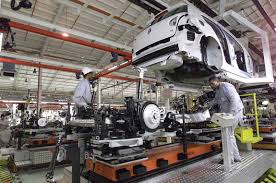The Manufacturers Association of Nigeria (MAN) has pegged the composite manufacturers Chief Executive Officers (CEO) Confidence Index (MCCI) of the fourth quarter of 2021 at 55. 4 points.
This translates to a 1.4 point increment from the third quarter.
The President of MAN, Mr Mansur Ahmed, made this known in the MCCI report made available to newsmen on Saturday in Lagos.
Ahmed noted that the value showed improved performance and growing confidence of manufacturers in the economy.
He listed key factors considered during the research to include accessibility and availability of foreign exchange, lending rates, size of loan to the sector and government’s capital expenditure.
Others, he said, are, operating environment performance regulation, taxation, ports accessibility, local sourcing of raw materials, patronage of made in Nigeria goods, and unsold manufacturing products.
Ahmed said the index for current business condition increased by 1.15 points in the quarter under review from 50.3 points recorded in the third quarter of the year.
Similarly, index for business condition for the period increased by 3.2 points in the quarter from the 55.8 points obtained in the preceding quarter.
“The fourth quarter of 2021 highlighted a gradual improvement in the macroeconomic economic and manufacturing operating environment buttressed by marginal recovery of some key manufacturing indicators.
“Although, changes in almost all manufacturing indicators as measured in this report are still not as desired, the performance in the fourth quarter is better than what obtained in the preceding quarter.
“The resilience of manufacturers, the seasonal transactions and passive policy support sustained manufacturing in the quarter despite the prevalence of familiar and emerging excessive tax-related challenges faced by manufacturers.
“Overall, the sector recorded a mixed grilled performance occasioned by meagre improvement in the operating environment indices and macroeconomic ambience evidenced by the high points.
“In the period under review, the economy witnessed improvement in the volume of economic activities due to the conventional positive seasonal effect notwithstanding the hangover and various waves of COVID-19,” he said.
The MAN President said index for current employment increased by 3 points in the quarter under review from 47.6 points obtained in the third quarter.
In the same vein, index for employment condition for the next three months increased by 2.1 points from 52.3 points recorded in the preceding quarter.
“The increasing index of employment reflects the improvement in business condition in the economy during the quarter under review.
“It also shows that manufacturers are beginning to engage/re-engage workers after the unplanned retrenchment forced by COVID-19 pandemic and other economic challenges,” he said.
The index for production level for the next three months however decelerated to 61.5 points from 64.3 points obtained in the third quarter of the year; thus, indicating 2.8 points decline over the period.
The decline, Ahmed said, could be attributed to the poor access to foreign exchange for the importation of vital raw materials and machines that were not available locally.
Others, he said, were the progressive erosion of the disposable income of consumers and the sluggishness associated with the first quarter of the year promoted by the uncertainty around the likelihood of another lockdown in the wake of new wave of COVID-19.
Ahmed said that 75.1 per cent of manufacturers claimed that forex sourcing by the sector did not improve in the quarter under review, which is higher than 59 per cent that disagreed in the preceding quarter.
He said that borrowing remained a perennial constraint of manufacturing in the country as manufacturers believed that the current lending rate discouraged productivity in the sector.
The MAN President noted that 75.1 per cent of manufacturers which is higher than 68 per cent of the preceding quarter observed that the current lending rate discouraged productivity in the sector.
“During the fieldwork of the report, manufacturers identified numerous challenges that affected manufacturing operation, particularly in the quarter under review.
“The ranking of issues by CEOs in order of intensity include high cost of local and imported raw materials, insecurity within the industrial areas, shortage of skilled manpower, high cost of transportation, inconsistency in government policies and foreign exchange difficulty,” he said.
To improve the performance of the sector, the MAN President urged government to further incentivize investment in the development of raw-materials locally through the backward integration and resource based industrialization initiates.
Ahmed said specific attention must be given to the security of life and investment in industrial areas, and government must ensure effective allocation of available forex to productive sectors.
“Government should direct the Ministry of Science Technology and Innovation to implement the strategies for the Executive Order to designate local manufacturers of LPG Gas Cylinders as priority provider of the 10 million cooking gas cylinders to be procured by the government for 12 States in the Federation.
“Milk and other dairy products should also be returned to the national list in the fiscal policy guidelines to maintain consistency with the Backward Integration Programme, which has spurred heavy investments in the diary production.
“Government should ensure that industrial policies in the country are allowed to gestate with proper monitoring and evaluation rather than jettisoning or altering them unduly frequently,” he said.




